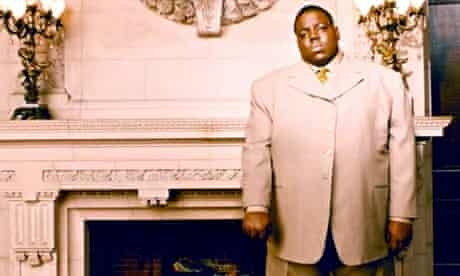Why Did Biggie and 2pac Beef
T he only thing more powerful than a premature death is a death foretold. When Notorious BIG closed his second album, 1997's Life After Death, with the track You're Nobody (Til Somebody Kills You), and was promptly murdered just weeks before its release, hip-hop's characteristic blurring of life and art reached its grisly apotheosis. Just months earlier, his bitter rival Tupac Shakur had also been shot dead, and his own posthumously released final album, The Don Killuminati: the 7 Day Theory, was rife with paranoia and fodder for conspiracy theories. The two murders, both still unsolved, comprise the defining drama in the history of hip-hop.
From the start, the two men's vexed relationship had an enthralling yin-yang quality. They were born less than a year apart: Tupac in 1971, Biggie (aka Christopher Wallace) in 1972. Tupac worked on the west coast, Biggie on the east. Tupac had the good looks, revolutionary heritage (his mother was former Black Panther Afeni Shakur) and poetic aspirations, but only middling skills. Biggie had the gangster credentials (he used to deal crack in Brooklyn), everyman appeal and effortless, weighty-but-nimble flow — to him, rapping itself was sheer poetry. They both thought big: hip-hop heroes for the mainstream rather than the cognoscenti.
They were on good terms until Tupac was shot five times in a Manhattan recording studio on 30 November 1994. He suspected Biggie and his mentor, Sean "Puffy" Combs, of arranging the shooting. After serving almost a year in jail for sexual abuse, he signed with Death Row, whose shady kingpin Suge Knight had his own grudge against Combs. Old-fashioned territorial rivalry, a familiar and largely harmless theme in hip-hop, blossomed into a more dangerous vendetta between the east and west coast factions, stoked by lyrical provocations from Biggie (Who Shot Ya?) and Tupac (Hit 'Em Up). "Fear got stronger than love, and niggas did things they weren't supposed to do," Tupac ominously told Vibe magazine.
But this is where the myth risks overtaking reality. Despite numerous competing theories, nobody has ever been prosecuted for either murder, and there's no evidence that the feud directly led to the killings. And the MCs' grim premonitions stemmed more from bravado than a genuine death wish. Tupac's 1996 album All Eyez on Me and Biggie's Life After Death were both brash, triumphalist, vibrant records. (Even the title of the latter's 1994 debut, Ready to Die, was Puffy's idea; Biggie preferred the Gotti-inspired The Teflon Don.)
Taken together, the two records are complex, compendious celebrations of the kind of superstar lifestyle that had fallen from favour in rock music, with a keen sense of the low expectations and narrow opportunities that their creators had escaped. For evidence of their differing approaches, take Tupac's Hold Ya Head ("My aim is to spread more smiles than tears/Utilise lessons learned from my childhood years") or Biggie's earlier hit Juicy ("Damn right I like the life I live/'Cause I went from negative to positive"). Each man had an angel on one shoulder and a devil on the other. At any given moment each could be either witty or morose, socially conscious or self-serving, sensitive or brutal, invincible or doomed. All hip-hop life was here. Neither man seemed ready to die.
Tupac was shot after a Tyson fight in Las Vegas on 7 September 1996 and died of internal bleeding six days later in critical care at the University Medical Centre. Biggie was hospitalised in a car crash that same year and began walking with a cane. Combined with his physical heft and penchant for expensive suits, it made him look much older than his 24 years: Big Poppa, as he called himself in one song. On 9 March 1997, after attending a party in Los Angeles, he was also fatally hit in a drive-by shooting.

The deaths became iconic for many reasons. One was the enduring mystique of the young talent who burns out before he can fade away. Past a certain age, every MC struggles to recapture the energy and relevance of their early years, but Biggie and Tupac never had time to grow slow and lazy. The murders also lent hip-hop the tragic dimension it had long been gesturing towards. For all its gun-toting machismo, mid-90s hip-hop had a sentimental streak, and Puff Daddy's mawkish tribute to his fallen pal, I'll Be Missing You, became one of the biggest-selling rap singles ever, the musical equivalent of a memorial portrait spray-painted on a wall. The killings gave hip-hop real-world pathos.
In death, their paths diverged. Tupac, always more self-conscious in his myth-making, became the rapper as icon, scrutinised by academics and revered worldwide as a latter-day Bob Marley, with many of his troubling contradictions washed away. Biggie, always more down-to-earth, remains the MC's MC, remembered for his lyrical skills and abundant appetites, and a vital inspiration to two of hip-hop's most significant empire-builders, his friends Puffy and Jay-Z. In their different ways, their short careers and dramatic demises helped make hip-hop an all-conquering global force.
washingtonburminfely.blogspot.com
Source: https://www.theguardian.com/music/2011/jun/13/tupac-biggie-deaths
0 Response to "Why Did Biggie and 2pac Beef"
Post a Comment